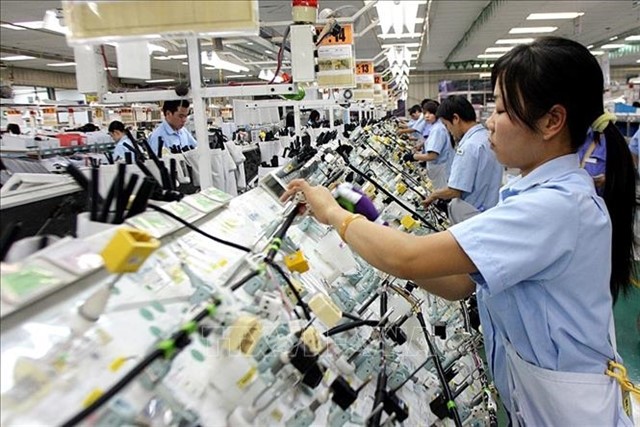WTO membership has not only reshaped Việt Nam’s economy but also elevated its standing on the global stage, driving growth, fostering innovation and unlocking new opportunities for international trade.

Việt Nam's WTO accession in 2007 marked a key milestone in its integration and development. Despite challenges, the country’s achievements reflect its drive to improve the business environment and integrate globally. The WTO negotiation team played a key role in trade talks, free trade agreements (FTAs) and agreements with organisations like the Trade and Investment Framework Agreement (TIFA) and Indo-Pacific Economic Framework (IPEF).
Trịnh Minh Anh, head of the International Economic Integration Steering Committee and WTO Negotiation Team Office, discussed those milestones with Vietnam News Agency.
Looking back at the WTO accession process, what achievements has Việt Nam made?
Joining the WTO has opened significant opportunities for Việt Nam to integrate into the global economy, driving strong GDP growth and advancements in manufacturing, exports and investment.
Exports, for example, rose from US$48.5 billion in 2007 to around $264 billion in 2019, more than fivefold in just 12 years.
Việt Nam now exports goods to over 200 countries and territories, with major markets like the US, EU, China and Japan becoming key trade partners. Global corporations like Samsung, Intel and LG have invested in Việt Nam, enhancing its manufacturing capacity and reinforcing its position in the global supply chain.
This export boom has improved Việt Nam's trade balance, moving the country from frequent deficits to consistent trade surpluses since 2011, reflecting enhanced production and supply capabilities. Furthermore, WTO membership has been pivotal in attracting foreign direct investment (FDI), particularly in export-oriented industries, contributing to job creation, industrial development, and better living standards.
As a WTO member, Việt Nam has also had the chance to contribute more actively to global economic issues, increasing its international standing. The WTO also prompted Việt Nam to reform its trade policies, align with international commitments, and foster fair competition, improving the overall business environment.
Additionally, Việt Nam’s active participation in bilateral and multilateral FTAs, including the Comprehensive and Progressive Agreement for Trans-Pacific Partnership (CPTPP), the Việt Nam-EU Free Trade Agreement (EVFTA), and the Regional Comprehensive Economic Partnership (RCEP), has opened new markets and expanded economic cooperation.
This membership has not only elevated Việt Nam’s international standing but has also contributed to reducing poverty, raising incomes, and improving the quality of life for its people.
What opportunities and challenges has WTO membership brought to Vietnamese businesses?
WTO membership has opened up international markets for Vietnamese businesses, providing tariff advantages and access to key trade partners, which has boosted export revenue. The demand for high-quality products in these markets has driven companies to improve their technology and management, enhancing their global competitiveness.
This integration has also attracted FDI, bringing in capital, technology and expertise. Vietnamese firms have joined global supply chains, leading to high-value exports and stronger links between domestic and international businesses, thereby creating jobs and improving management skills.
However, WTO membership also means increased competition from foreign goods, challenging Vietnamese small and medium enterprises, which often lack capital and technology. Companies must meet strict international standards on quality, safety and environmental protection, posing difficulties for smaller firms with limited resources.
Additionally, despite reduced tariffs, non-tariff barriers in many markets still pose challenges for Vietnamese exporters. Limited access to modern technology and capital, as well as a shortage of skilled human resources, further hampers productivity and competitiveness.

What solutions has the Ministry of Industry and Trade implemented to support businesses?
The Ministry of Industry and Trade (MoIT), alongside the International Economic Integration Steering Committee Office, has taken practical steps to support Vietnamese businesses amid global integration. Key efforts include boosting trade promotion, facilitating participation in international trade fairs and connecting businesses with global partners. The ministry provides updates on market trends, regulations and economic forecasts to help firms navigate international markets.
To enhance competitiveness, MoIT collaborates with banks to offer preferential loans, particularly for small and medium enterprises and encourages investment in R&D and technology. It also conducts training in management, e-commerce and international regulations.
The ministry provides legal guidance on FTAs, rules of origin, intellectual property, and trade defence, helping businesses protect their rights in international disputes. It also supports the development of e-commerce and digital transformation by encouraging the use of digital technologies and establishing a national e-commerce platform.
Additionally, the Ministry collaborates with industry associations to strengthen supply chains, connect domestic businesses and build a sustainable business ecosystem. These efforts reduce reliance on foreign suppliers and boost the competitiveness of Vietnamese products in global markets.
How can Việt Nam enhance its economy and deepen WTO integration in the coming years?
To further develop its economy and deepen global integration, Việt Nam needs to refine its economic policies and institutional frameworks to align with WTO commitments. Enhancing transparency, improving the legal system and streamlining administrative procedures are essential to create a favourable business environment and attract investment.
Training a skilled workforce should be a focus, with emphasis on vocational training, professional skills and management capacity. Investing in technology and fostering innovation can boost productivity and product quality. Leveraging digital technology and AI will be key to meeting international standards.
Developing domestic supply chains to reduce reliance on foreign inputs is crucial. Strengthening links between local and foreign enterprises and promoting the supporting industry will enhance self-sufficiency and resilience against global disruptions.
Việt Nam should diversify its export markets beyond major partners, targeting emerging and developing markets. Trade promotion and product marketing at international fairs and exhibitions are essential.
To address trade defence challenges, Việt Nam needs to raise business awareness and provide training on trade defence measures, supported by an early warning system from the Ministry of Industry and Trade.
In particular participation in WTO activities and economic forums is vital to protect national interests and assert Việt Nam’s position in global economic discussions, ensuring sustainable growth and contributing to global development. — VNS





